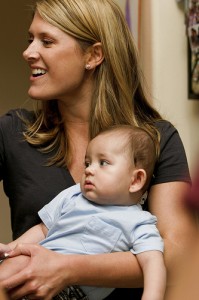Is Extra Maternity Leave Bad for Child Cognitive Development?
 Photo: Varin Tsai
Photo: Varin TsaiBack in March we wrote about a Norwegian study which showed that an increase in maternity leave led to lower high-school dropout rates for the children of those moms. But a new working paper about maternity leave in Canada (abstract here) highlights some possible negative effects of extra maternity — specifically on a child’s cognitive development at ages 4 and 5. At issue isn’t the extra time a mother spends with her child, but the timing of when she returns to work, and the abrupt change it causes.
Michael Baker of the University of Toronto and Kevin Milligan of The University of British Columbia focused their research on a Canadian law passed at the end of 2000 that extended maternity leave from 6 months to a full year. As a result, the timing of the return to work changed from an average of just under 6 months to nearly 9 months:
We find that the expansion of parental leave — and the resulting extra time mothers spent with their child in his/her first year of life—had no positive impact on indices of children’s cognitive and behavioral development; this despite the fact it had substantial impacts on the maternal care and non-licensed non-parental care children received in their first year, as well as how long they were breastfed. For our behavioral indices we can rule out all but very modest improvements. For our cognitive measures the estimated impact of the reform is small, negative and statistically significant for PPVT and Who Am I? This latter result highlights the relatively neglected issue of how changes in maternity leave laws affect the timing of the mothers’ return to work. Specifically, it is consistent with the hypothesis that some ages are better than others for abrupt changes in the parent-child relationship.

Comments